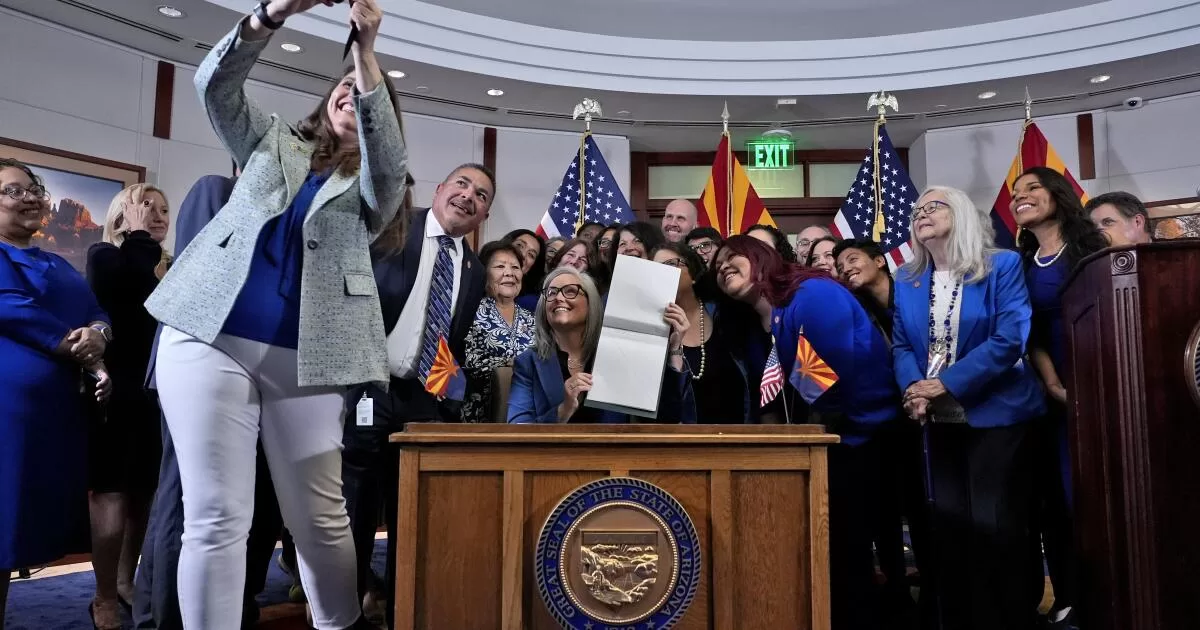Arizona’s Civil War-era ban on nearly all abortions officially was repealed Saturday.
The Western swing state has been whipsawed over recent months, starting with the Arizona Supreme Court deciding in April to let the state enforce the long-dormant 1864 law that criminalized all abortions except when a woman’s life was jeopardized. Then state lawmakers voted on a bill to repeal that law once and for all.
Democratic Arizona Gov. Katie Hobbs signed the bill in May, declaring it was just the beginning of a fight to protect reproductive healthcare in Arizona.
“I will continue doing everything in my power to protect reproductive freedoms, because I trust women to make the decisions that are best for them, and know politicians do not belong in the doctor’s office,” Hobbs said in a statement.
Abortion has sharply defined Arizona’s political arena since the U.S. Supreme Court overturned Roe vs. Wade in 2022. As the November general election approaches, the issue remains a focus of Democratic campaigns, and it will be up to Arizona voters to decide whether to enshrine the right to abortion in the state constitution.
It was after the state Supreme Court cleared the way for enforcement that Hobbs urged the state Legislature to take imminent action to undo the ban before it went into effect. Republican lawmakers, who hold a narrow majority in both chambers, derailed discussions about repealing the ban. At one point, the roadblocks resulted in chants of “Shame! Shame!” by outraged Democratic colleagues.
Emotions on the House floor and in the gallery ran high as House Democrats were able to garner the support of three Republicans to pass the repeal legislation two weeks later, sending the measure to the Senate for consideration. Two GOP senators joined with Democrats a week later to grant final approval.
Democrats were advocating for the repeal long before the Supreme Court issued its ruling. Even Hobbs called for action in her January State of the State address.
The battle in Arizona made national headlines again when Democratic state Sen. Eva Burch told fellow lawmakers in a floor speech in March that she was going to get an abortion because her pregnancy was no longer viable. She said in an interview that it was her chance to highlight that the laws passed by legislators in Arizona “actually do impact people in practice and not just in theory.”
In the weeks between the high court’s decision and Hobbs signing the repeal into law, Arizonans were in a state of confusion about whether the near-total ban would end up taking effect before the repeal was implemented.
A court order put the ban on hold, but questions lingered about whether doctors in the state could perform the procedure. California Gov. Gavin Newsom weighed in on the issue in late May, signing legislation allowing Arizona doctors to receive temporary, emergency licenses to perform abortions in California.
With the territorial ban no longer in play, Arizona law allows abortions until 15 weeks. After that, there is an exception to save the life of the woman, but missing are exceptions for cases of rape or incest after the 15-week mark.
Arizona requires those seeking an abortion before the 15-week mark to have an ultrasound at least 24 hours before the procedure and to be given the opportunity to view it. Minors must have either parental consent or authorization from a state judge, except in cases of incest or when their life is at risk.
Abortion medication can be provided only through a qualified physician, and only licensed physicians can perform surgical abortions. Abortion providers and clinics also must record and report certain information about the abortions they perform to the department of health services.
Voters will have the ultimate say on whether to add the right to an abortion to the state constitution when they cast their ballots in the general election.
Arizona for Abortion Access, the coalition leading the ballot measure campaign, was successful in securing the measure’s spot on the ballot. The Arizona secretary of state verified 577,971 signatures that were collected as part of the citizen-led campaign, well over the 383,923 required from registered voters.
If voters approve the measure, abortions would be allowed until fetal viability — the point at which a fetus could survive outside the womb, typically around 24 weeks. It also would allow abortions after that time in cases where the woman’s physical or mental health is in jeopardy.
Govindarao writes for the Associated Press.
